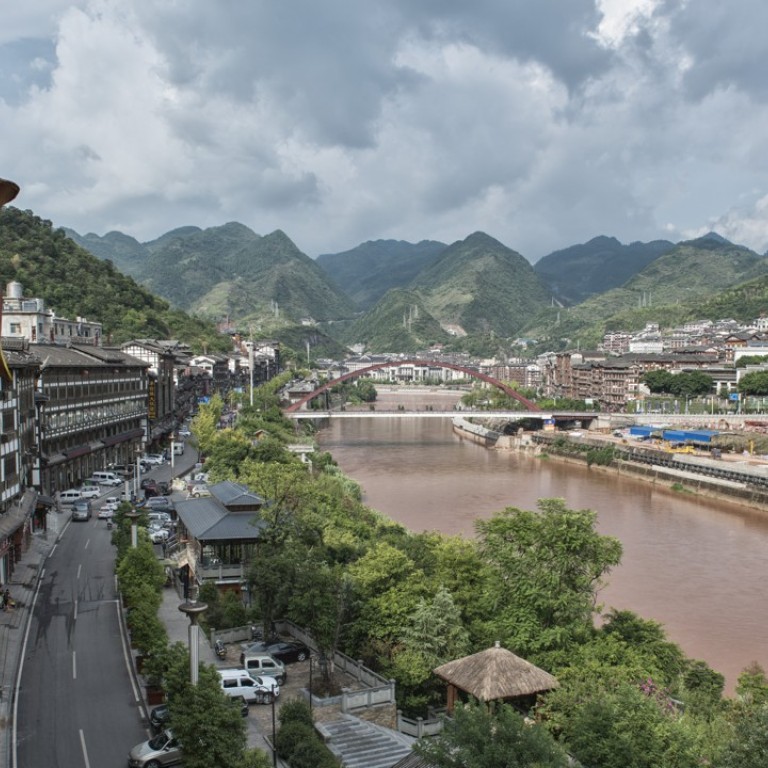
Inside fortress Maotai: secrets of China hard liquor that’s rocket fuel for its soft power ambitions
- Breaching a cordon of Chinese soldiers, we see inside the distillery of Kweichow Moutai, top producer of China’s most famous liquor
Visitors detect Maotai, nestled on the slopes of a tiny valley in the north of Guizhou province, long before they see the small town. The stench from its fermentation tanks is carried on the wind, and is so pervasive that locals do not even notice it. “What smell?” they ask, with surprise.
Maotai gives its name to China’s most famous liquor, as well as its part publicly traded and part state-owned producer, Kweichow Moutai, which was founded in 1951 with the merger of three distilleries. Maotai is a brand of baijiu (translated literally as “white liquor”), a blend of distilled grains that is the national spirit. It is also the world’s most valuable liquor brand by market valuation.
Mao Zedong’s favourite tipple is now a 1 trillion yuan company
Despite being a fiery 53 per cent alcohol by volume, Maotai was served at the founding of the People’s Republic of China, in 1949. And during the 1972 summit between China and the United States, Chinese premier Zhou Enlai used the liquor to toast American president Richard Nixon, with the US secretary of state, Henry Kissinger, reportedly announcing, “I think if we drink enough Maotai, we can solve anything.”
This peacemaker is also “a symbol of excellence and opulence”, or so claims the Kweichow Moutai website.
In July, a bottle of 80-year-old Maotai was sold at auction in Hangzhou for 1.7 million yuan (US$245,000). According to Xinhua, industry insiders were disappointed by that figure, which fell far short of the record 10.7 million yuan fetched in 2011 by a rare 1935 Lay Mau edition.
The thirst for Maotai is such that Christie’s has a webpage dedicated to the spirit, to advise bidders from around the world. The auction house’s online guide states, “Collectors are interested in quality, but also in the strong price appreciation for Maotai.”
And while some choose to invest in bottles of the stuff, others prefer Kweichow Moutai’s Shanghai-traded shares. Last year, the brand’s share price increased more than 100 per cent; although, since peaking in June this year, it has lost some ground.
“Our goal is to march forward, improving our brand image, fulfilling social responsibility, promoting Chinese culture and becoming a respected, world-class enterprise,” says brand manager Wu Dewang.
There is just one problem: there is not enough Maotai to go around.
“Maotai can be produced only in Maotai town, where a very specific microclimate creates the perfect conditions for baijiu,” explains production manager Zhou Xianlun, speaking in one of the buildings where sorghum is fermented.
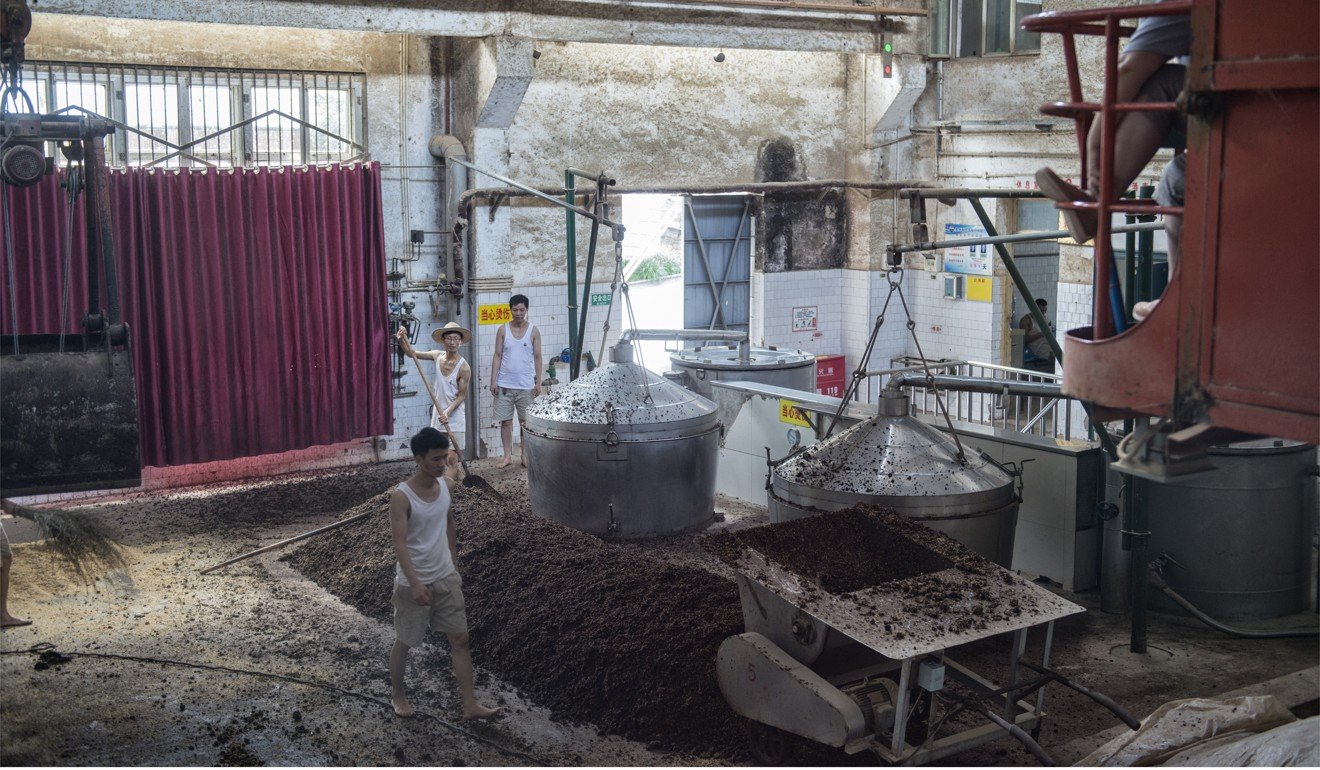
Christie’s goes into more detail: “Maotai Town has a particular climate: mild winters and hot summers, low wind and rainfall, but high temperatures and humidity.”
Ingredients are also crucial, of course.
“We use only the purest quality water from the Chishui River [a protected waterway alongside which no chemical factories are permitted], which is very rich in micronutrients, locally grown and processed sorghum, and qu, a mix of yeast and mould,” Zhou says. “The production process involves nine distillations, eight filtrations and seven fermentations, all of which are done by hand. In all, even the basic Maotai takes at least five years to make.”
All of which explains why it is both difficult and expensive to get one’s hands on Feitian, the standard version of the liquor, a 500ml bottle of which costs 1,499 yuan. Even visitors to the company headquarters are allowed to purchase just two bottles per ID card. The same restriction applies to buyers using the official website.
Beer or baijiu? China’s drinkers become more quality conscious
“Our target is to go from our current 48,000-tonne yearly production to 56,000 tonnes,” Wu says. “It will be hard to go beyond that, because that could affect the ecosystem and quality, and on those we will not compromise.
“We have to think about Maotai as a scarce resource.”
A senior company official, who asks to remain anonymous, says: “People’s income has skyrocketed and we will never be able to match the rapidly increasing demand because Maotai is an affordable luxury and a very important piece of the social and business cultures of China.
“When I joined [Kweichow] Moutai, almost 20 years ago, sales were 900 million yuan. Last year, we recorded a record 76.4 billion and we expect to reach 90 billion in 2018.
“But we have put certain restrictions in place to reduce speculation and have a better control of supply. For example, we now forbid dealers from increasing prices and overstocking.”
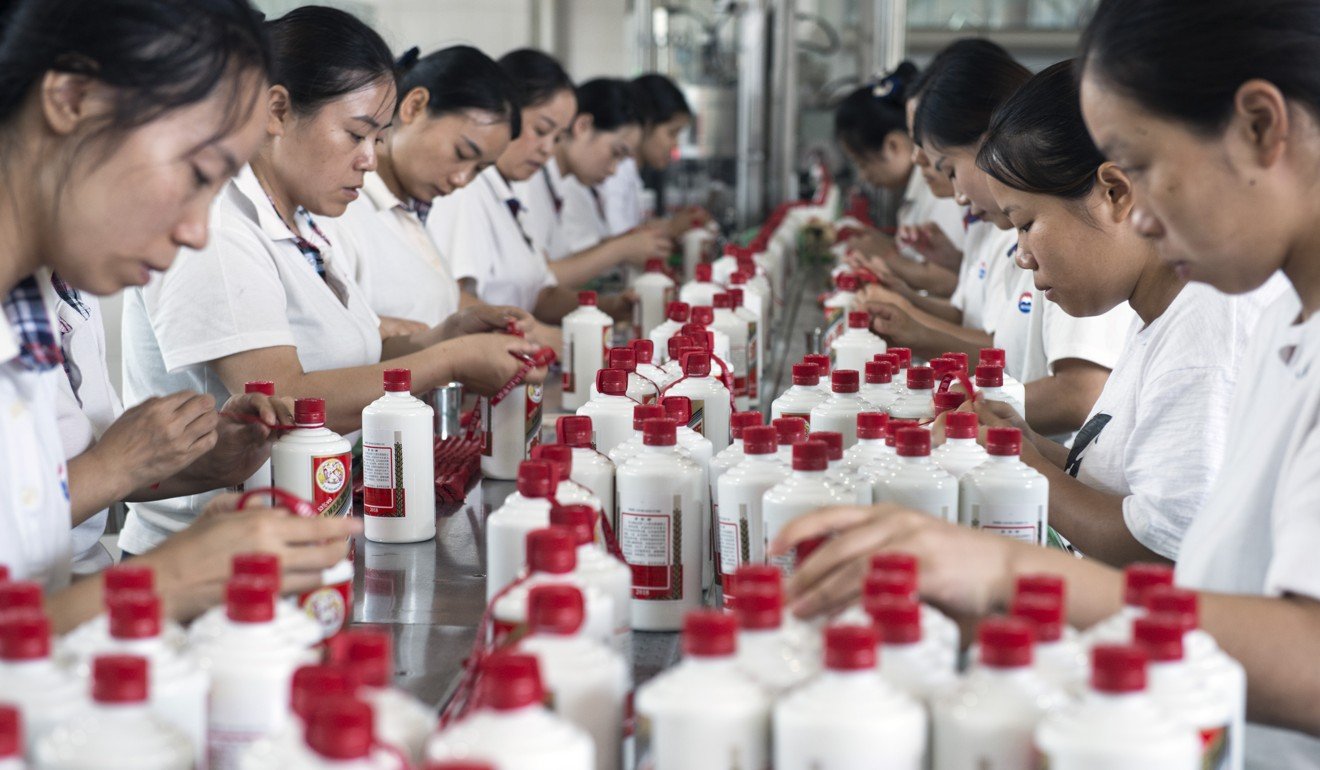
Kweichow Moutai’s facilities are fortress-like, and a lengthy approval process, overseen by the People’s Liberation Army, must be negotiated before a visitor is allowed to enter. The warehouses are guarded by the military, the soldiers thoroughly checking all permits and stamps.
“In all, we have 247 buildings for storage, although some are still being built,” says Cai Ying, who manages the oldest warehouse. “We use very specific earthenware jars made in Sichuan province and we store 800,000 of them. Currently, we have 250,000 tonnes of Maotai in our warehouses.”
Cai opens her warehouse’s heavy metal door, closing it quickly once we have entered. She points to a device that measures temperature and humidity. “Storage conditions are very specific and we have to avoid any changes,” she says.
Some of the filled jars have been standing here since the late 1980s.
“Baijiu masters will come and open them a few times a year, to rate their class and decide when is the best time to put the liquor on the market,” says Cai. “The longer it stays in the jar, the yellower the baijiu turns and the more expensive it gets. But only the best is selected to remain stored for up to 80 years.”
China trains sommelier army for battle to make baijiu the new whisky
We are treated to a cup of a rare, yellowish Maotai in an adjacent building, but the woman holding the unlabelled bottle refuses to tell us how old it is. Although as powerful as the regular Feitian, this Maotai slips down easier, and faint soy sauce notes are detectable.
According to Kweichow Moutai literature, its signature spirit contains no fewer than 155 distinct aromas – from chocolate to tobacco – making it impossible to clone.
“Attempts to produce this mysterious spirit in other areas of China and beyond have failed,” declares the company website. “Due to high demand, the official producers of Maotai themselves have attempted to increase production by building a factory upstream of the town of Maotai, but found the quality and flavour to be inferior despite it being produced using the same river water and ingredients.”
Kweichow Moutai is not the only baijiu producer in Maotai, though. With a population of just over 100,000, the town is home to hundreds of smaller distilleries (Christie’s describes the output of these as “Maotai town baijiu”, reserving the term “Maotai” exclusively for the premier producer). The liquor’s popularity means hotels and, naturally, baijiu shops are plentiful.
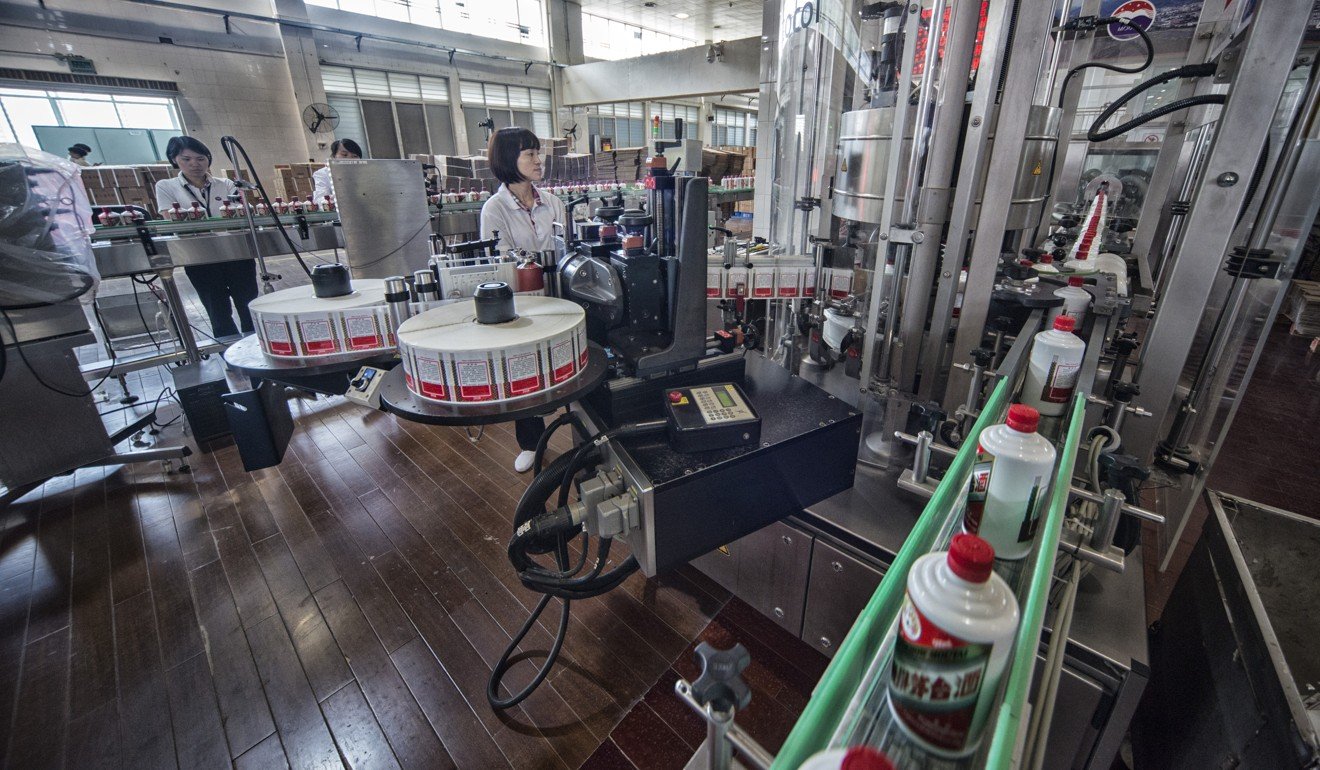
Tian Shaobo owns a distillery named Yizui Fangxiu, which translates as “don’t stop until drunk”. His shop is located on a street north of the Chishui.
“We sell a tonne of liquor per day, on average,” says Tian, sealing some intricately adorned porcelain bottles. “We have no agents, so all we sell is what people buy at the store. Word of mouth works because our quality is very good and our prices are lower than those of Maotai.”
The businessman explains that his operation began in 1984, and most of his family and friends work in the industry.
“There is a lot of competition, but I’m not under pressure because business is good and I have no debts,” he says. “And I don’t fear having stock on hand because liquor doesn’t expire. It gets more expensive.”
Tian’s cheapest baijiu sells for 100 yuan per half litre. “Our best-sellers cost about 400 yuan,” he says, about a quarter of the price Feitian fetches.
“That is a unique product,” he concedes. “Even though we make liquor in the same place and with very similar ingredients, I can say my liquor tastes similar but not the same. Their blend is far better, and has a unique complexity.”
Targeted in crackdown, Moutai liquor is once again the toast of the town
Not everybody can taste the difference, however, and fakes have become a problem. In January, state media reported that 7,488 bottles of counterfeit Maotai, weighing 3.7 tonnes, had been destroyed by Guizhou provincial authorities. In May, online commerce platform JD.com alerted police to the fact that at least five batches of Feitian in its Shandong warehouse were fake. Last year, two men in Guizhou received prison sentences of three and 3½ years for making counterfeit Maotai.
“If we catch any of our authorised dealers selling fake Maotai, apart from facing legal repercussions, they will lose the 100,000-yuan deposit required to do business with us, and they will be banned for life from our network,” the senior company official at Kweichow Moutai says. “But we can only do so much. The rest is a job for the government,” he adds, with implied criticism. “It’s important to strengthen intellectual property laws and, especially, the enforcement of them.”
And although not genuinely fake, other baijiu brands employ lettering and logos, as well as bottle design, similar to those used by Kweichow Moutai. Using “Maotai” in a product’s name is not illegal because, while Moutai is a registered trademark, Maotai refers to the town.
“Some have a very obvious lack of ethics,” Tian says. “We believe the industry has to focus on legit products. [Producers] pay huge amounts of taxes from which we all benefit.
“If Maotai town has developed so fast – it even has an airport and plans to build a high-speed railway station – it is because of Maotai.”
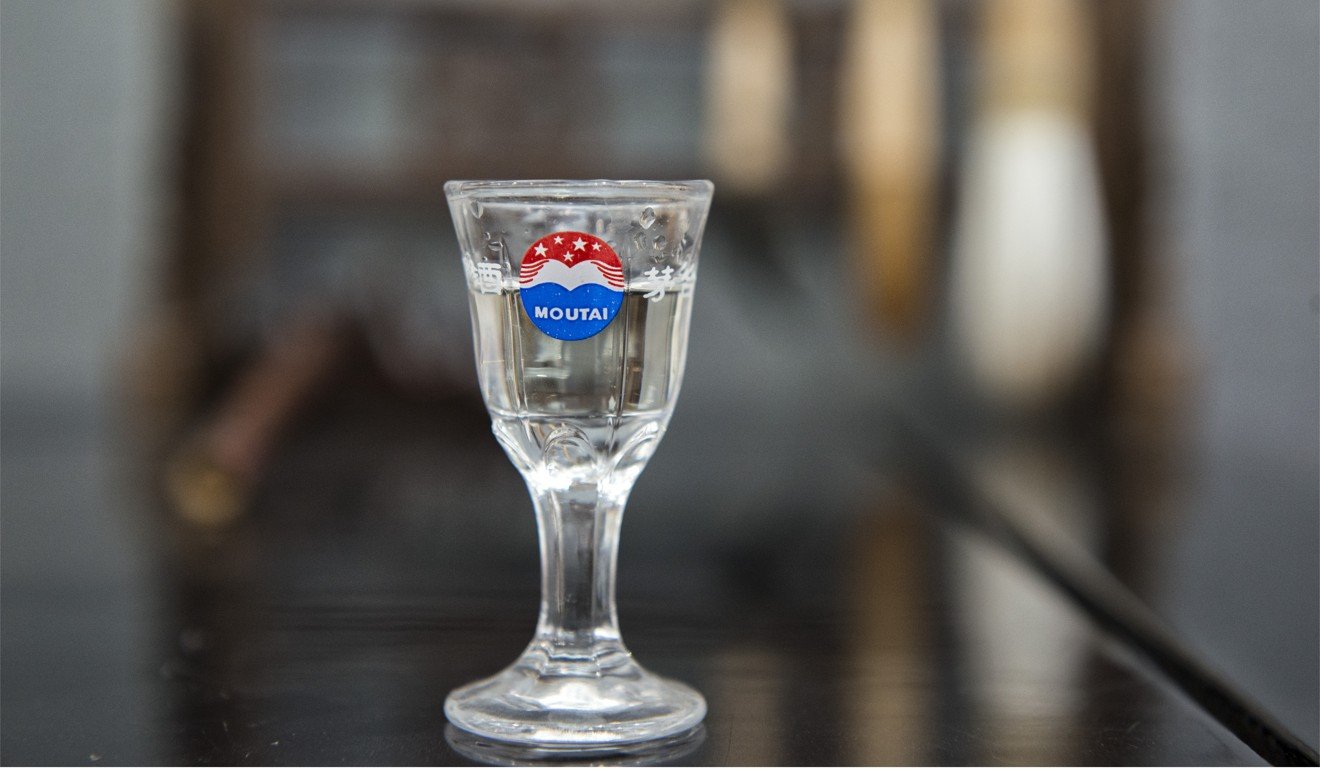
Adds the Kweichow Moutai official, “Renhuai city [a county-level area, under which Maotai town is administered] is among the top 10 performing [counties] in China, and the only one in Guizhou on the list. We paid 25.9 billion yuan in taxes last year, or about 90 per cent of all the state-owned enterprises’ tax contributions in the province. Thanks to the company, Maotai has a college and a triple A-rated hospital. And we help farmers by paying higher than market prices for their sorghum.”
In the bottling facility, many of the workers tying red ribbons to the necks of bottles are pregnant. “We take care of their needs and give them a less stressful job,” the floor manager tells us.
Kweichow Moutai’s image is not spotless, however, having been sullied by high-profile cases of corruption. Former deputy general manager Tan Dinghua, for example, was investigated in 2016 for “serious violations of discipline”, a euphemism for corruption frequently employed by the Communist Party. There has been no news of him since.
Maotai has traditionally been served during lavish official banquets, which have been forbidden since 2013, when Xi Jinping came to power, vowing to put an end to “ostentation and extravagance among officials’ spending”. The liquor has also been used to bribe civil servants. As the saying goes, “Those who buy Maotai, never drink it; those who drink it, never buy it.”
China investigates former Moutai liquor executive over suspected corruption
Maotai has always been a drink for the powerful and wealthy, “never for ordinary people”, says another Kweichow Moutai employee who requests anonymity.
“When Xi Jinping enacted the ‘three public consumptions’ campaign [targeting car, banqueting and overseas-travel expenses] to stamp out corruption, we had a three-year crisis,” he says. “But we have restructured and this transformation has ensured more transparency and business diversification. We are now stronger and better suited to compete in the market economy.”
The restructuring introduced a global strategy, Kweichow Moutai aiming to export 10 per cent of sales, despite the chronic shortage of product.
“Our international development plan is aligned with China’s reform and opening-up policies,” explains Wu. “Our worldwide network already comprises 108 authorised agents in 66 countries. We especially target overseas Chinese customers, but we want to make Moutai a respected brand abroad. It will be a symbol of Chinese culture.”
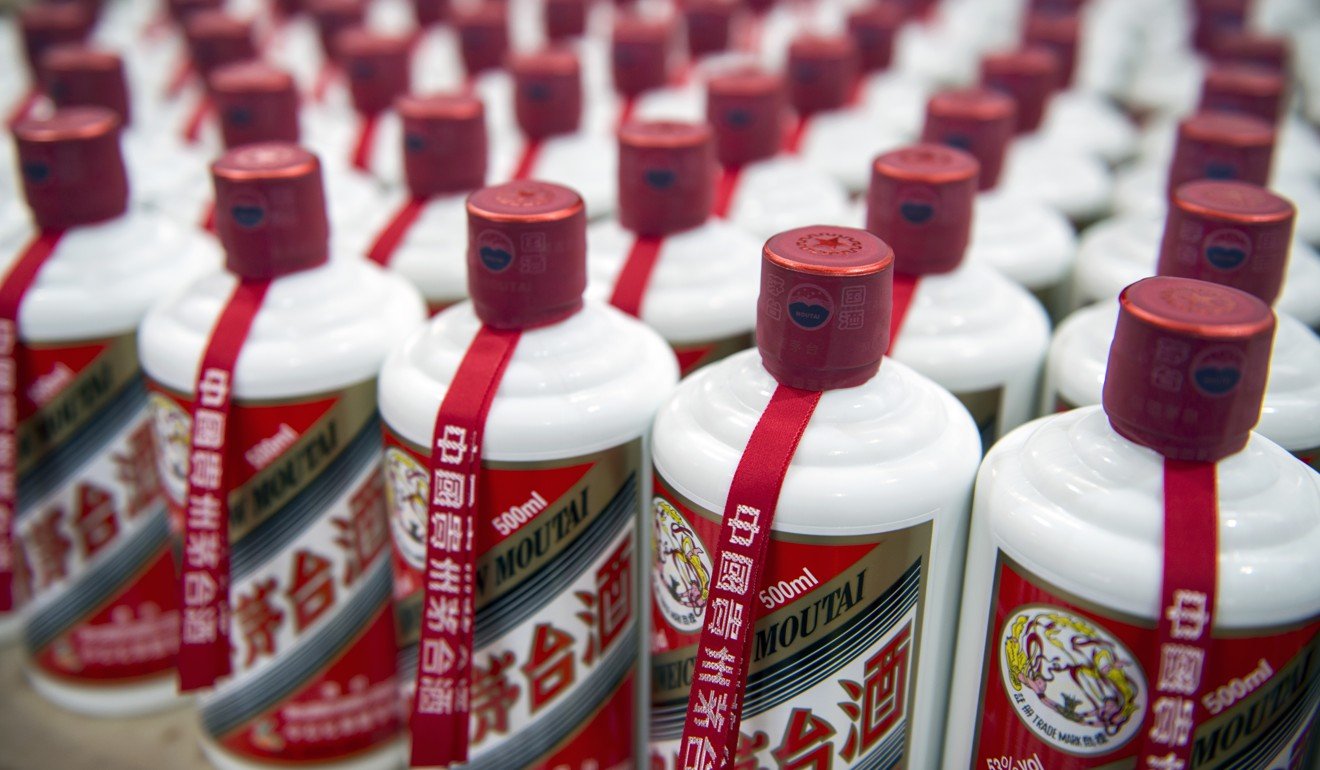
Will baijiu ever be as popular internationally as whisky or vodka? The Kweichow Moutai management believe so, eventually, but many foreigners in China are doubtful.
“The problem with baijiu is not only the high alcohol volume, and a taste we are not used to, but also the way it is drunk,” says Spaniard Iñaki Antoñanzas, Beijing-based Asia manager at industrial-components company Fagor Automation.
The cry of “ganbei”, signalling the need to down a glass of fiery baijiu in a single shot, is a terrifying one for many a foreigner attending a dinner, wedding or other celebration in China. Refusing a toast is considered rude. So for many, especially those with business or family in the country, that means getting hopelessly drunk.
“There have been many cases of deaths related to abuse of alcohol at business dinners,” confides an official at the Spanish consulate in Shanghai.
“I learned to drink some olive oil before business dinners,” says Antoñanzas. “This helps because you get drunk less quickly, and makes it easier to throw up when you have had too much.”
However, “Xi Jinping’s anti-corruption campaign and a new generation of younger salespeople have notably reduced alcohol consumption at business meals,” the businessman says. “Even clients that were hard-core baijiu fans have turned to red wine.”
Moutai’s market value is more than half the GDP of its home province
Nevertheless, Wu, who claims Maotai does not cause hangovers, remains undaunted.
“Whisky and vodka have become common, even among Chinese people, because Western culture has become hegemonic and producers have invested heavily in promotion,” the brand manager says. “We are aware of the need to adapt both at home and abroad. That has prompted new lines of products in China, and we have even designed signature cocktails with Maotai for international markets.”
On the outskirts of Maotai town, a 30-metre-tall structure resembling a Maotai bottle reflects Kweichow Moutai’s towering ambition. In the National Liquor Culture Museum, a short walk to the east of the factory complex, visitors learn about production processes, the history of baijiu and why liquor from Maotai was the choice of emperors. Outside, street lights are shaped like ancient goblets; the evolution of the Chinese character jiu, meaning “liquor”, is depicted on a wall.
Come sunset, local women square dance in front of the golden sculpture of a flowing liquor jar by the Chishui, and visitors to a monument commemorating the Red Army’s four crossings of the river during the Long March discuss how many bottles they managed to buy or drink that day.
Many will go on to raise glasses again and again, and make toasts until they fall over. And no matter what they have been told, more than a few will wake up in the morning with a hangover.

